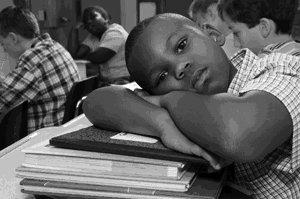Solutions, Not Suspensions | Key to Keeping Students in School
The South Carolina Appleseed Legal Justice Center has produced a report of innovative recommendations for reducing South Carolina’s alarming student and teacher dropout rates, part of a national effort to draw attention to the problem of zero-tolerance discipline policies.
The report Effective Discipline for Student Success: Reducing Student and Teacher Dropout Rates in South Carolina – promotes a research-based approach to school discipline that also improves academic performance and school safety. Its principles can be applied to schools everywhere.
The book is part of a larger effort to reform the state’s discipline practices and improve academic performance in South Carolina schools. Funding for its publication was provided by the Southern Poverty Law Center, a partner in SC Appleseed education work.
South Carolina’s high school graduation rate is only 61%, 49th in the nation.
136 students every school day – more than four classrooms worth –give up on school.
Research has shown that school discipline practices are a major factor in pushing vulnerable children out of school and, often, into the juvenile justice system, a path known as the “school-to-prison pipeline.” South Carolina’s school discipline rates consistently rank among the highest in the country.
 “We must make a fundamental commitment to keeping all of our students in school – not just those who are easy to teach but especially students who are struggling to succeed,” says Amanda Adler, education staff attorney at SC Appleseed. “We know suspensions and expulsions have a negative impact on academic achievement, on students’ emotional connections to the school, and on graduation rates – so why do we continue to rely on them?”
“We must make a fundamental commitment to keeping all of our students in school – not just those who are easy to teach but especially students who are struggling to succeed,” says Amanda Adler, education staff attorney at SC Appleseed. “We know suspensions and expulsions have a negative impact on academic achievement, on students’ emotional connections to the school, and on graduation rates – so why do we continue to rely on them?”
Research confirms that harsh school discipline yields poor results. Once suspended, students are more than four times more likely to drop out of school. Young people who drop out of high school are more than eight times as likely to be incarcerated as those who graduate. The report recommends limiting the use of school suspensions and expulsions on students.
Dissatisfaction with school discipline also is cited as the reason many new teachers in the state leave the profession. One third of teachers exit the profession within their first five years of service in the state. And currently, some districts in the state lose one-third of their teachers every year.
The SC Appleseed guide recommends implementing a program called Positive Behavioral Interventions and Supports (PBIS) in every South Carolina public school. PBIS fundamentally transforms the school into an environment where good behavior is taught and modeled by everyone from the principal to the custodian. Students are rewarded and praised for good behavior while discipline problems are addressed in a smarter way than under zero-tolerance policies now used in many schools.
Principals and teachers work together to determine the causes of problem behavior and develop school-wide and, when necessary, individualized plans to improve behavior. Office referrals are tracked and that information is used to determine when, where and why discipline problems are occurring. The end result is a reduction in suspensions, expulsions, and dropout rates, and South Carolina schools already implementing PBIS have reported major improvements in school climate.
“Our public schools are under pressures like never before, and their resources are already stretched far too thin to pursue policies that don’t work. Proven strategies like PBIS make the most of our investment in education, allowing more children to spend more time in school, actively learning and headed on a path to a bright future,” said Adler.

